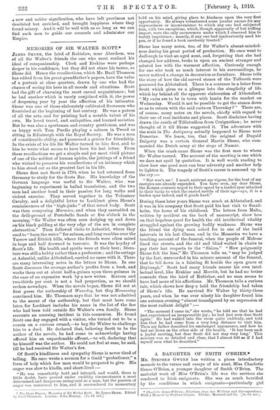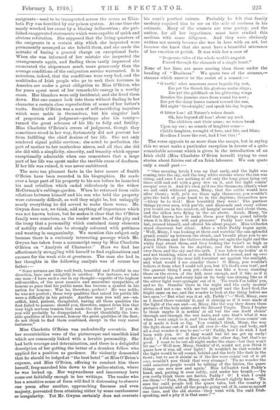A DAUGHTER OF SMITH O'BRIEN.*
Ma. STEPHEN GWYNN has written a pious introductory memoir to the verses and essays of his aunt, Miss Charlotte Grace O'Brien, a younger daughter of Smith O'Brien. The material work of Miss O'Brien's life was the services she rendered to Irish emigrants. She was as much horrified by the conditions in which emigrants—particularly girl
• Charlotte Grace O'Brien : Selections from her Writings and Correspondence.
With a Memoir by Stephen Gwynn. Dublin : Maunsel and Co. [3s. 6(1. net.]
emigrants—used to be transported across the ocean as Eliza- beth Fry was horrified by our prison system. At one time she nearly wrecked her cause by a blazing indiscretion ; she pub- lished exaggerated statements which were capable of quick and obvious refutation. She supposed that the living quarters of the emigrants in a certain ship which she inspected were permanently arranged as she beheld them, and she made the mistake of basing a general charge on exceptional facts.
When she was informed of her mistake she inspected the arrangements again, and finding them vastly improved she exonerated the shipowners much more generously than the average conditions of the emigration service warranted. It is notorious, indeed, that the conditions were very bad, and the multitudes of Irish people who go to seek their fortunes in America are under a great obligation to Miss O'Brien, who for years spent most of her remarkable energy in a worthy cause. Her blunders were only incidental, and she lived them down. But one cannot look into them without finding in her character a certain close reproduction of some of her father's traits. Smith O'Brien was a man of self-sacrificing impulses which were noble in themselves, but his singular lack of proportion and Judgment—perhaps also his vanity— turned the great schemes of his life to folly and futility.
Miss Charlotte O'Brien's errors of judgment, though they sometimes stood in her way, fortunately did not prevent her from fulfilling the chief desires of her life. She not only rendered signal public services ; she acted to perfection the part of mother to her motherless nieces, and all that she did she did with a simplicity, sincerity, and tenacity which appear exceptionally admirable when one remembers that a large part of her life was spent under the terrible curse of deafness. If her life was ruined, it was never embittered.
The none too pleasant facts in the later career of Smith O'Brien have been recorded in his biographies. He made over a large part of his property to his son before he launched his mad rebellion which ended ridiculously in the widow McCormack's cabbage-garden. When he returned from exile relations between himself and his son who held the property were extremely difficult, as well they might be, but unhappily nearly everything he did served to make them worse. Mr. Gwynn does not, we think, add anything of importance which was not known before, but he makes it clear that the O'Brien family were conscious, as the reader must be, of the pity and the irony that a personality which contained many elements of nobility should also be strongly coloured with pettiness and wanting in magnanimity. We mention this subject only because there is a curiously interesting passage which Mr. Gwynn has taken from a manuscript essay by Miss Charlotte O'Brien on "Analysis of Character." Here we find her affectionately struggling with herself to find explanations and excuses for the weak side ot greatness. The man she had in her thoughts in the following analysis was of course her father:—
" Some natures are like wall fruit, beautiful and fruitful in one direction, bare and unsightly in another. For instance, we take one man—I have such a one in my thought—capable of the highest self-sacrifice, of the most massive and masculine sympathies' of honour so pure that his public name has become a symbol in his nation for honour : Was he, therefore, perfect? He was noble, he was not perfect; those very qualities that raised his public life were a difficulty in his private. Another man you will see—un- selfish, kind, patient, thoughtful, having all those qualities the first failed to possess: should you, therefore, expect from him that very high nervous tension that made the first great? If you do you will probably be disappointed. Accept thankfully the love- able qualities of the second, honour the great qualities of the first; do not think to find them combined, except in the very rarest instances."
Miss Charlotte O'Brien was undoubtedly eccentric. But her eccentricities were of the picturesque and unselfish kind which are commonly linked with a lovable personality. She had both courage and determination, and there is a delightful description of her getting the better of a drunken fellow who applied for a position as gardener. He violently demanded that he should be lodged at "the best hotel" at Miss O'Brien's expense, and Miss O'Brien, offering to conduct him there herself, frog-marched him down to the police-station, where he was locked up. Her waywardness and inaccuracy have come out faithfully enough in her writings. The reader who has a sensitive sense of form will find it distressing to observe one poem after another, approaching fineness and even majesty, prevented from attaining either by some carelessness or irregularity. Yet Mr. Gwynn certainly does not overrate his aunt's poetical talents. Probably he felt that family modesty required him to err on the side of coolness in his estimate. Many of the sonnets are true poetry, and the author, for all her impatience, must have studied this medium with some diligence. And they were obviously written not merely because she was in love with an art, but because she knew that she must have a beautiful utterance of her emotion or perish. It was with her a case of
"Desperate tides of the whole world's anguish Forced through the channels of a single heart."
None of her lines are more moving than those under the heading of "Deafness." We quote two of the stanzas,—. stanzas which answer to the sestet of a sonnet :—
"0 earth ! what murmurs sweet beguile thy rest,
Ere yet the thrush his glorious matin rings ; Ere yet the goldfinch on his glittering wings Brushes the jasmine stars from round his nest ; Ere yet the daisy leaves turned toward the sun, Bid night Good-night,' and speak his day begun.
0 bitter loss ! all Nature's voices dumb.
Oh, loss beyond all loss ! about my neck The children cast their arms ; no voices break Upon my ear ; no sounds of laughter come— Child's laughter, wrought of love, and life, and bliss; Heedless I leave the rest, had I but this ! "
The verse appeals to us more than the essays, but in saying this we must make a particular exception in favour of a quite remarkable account which is given in the introduction of an Irish child (Miss Charlotte O'Brien herself) trying to coax stories about fairies out of an Irish labourer. We can quote
only a small part :— •
"One morning lately I was up that early, and the light was coming into the sky, and the long white streaks where the sun was rising, and sure I saw nothing at all only the long grass lying out there still and soft with a grey dew on it, and the light coniin' creepin' over it. And it's then ye'd see the thraneens (that's what we call ould withered grass, Missy, that the cattle would lave after them) ; well, ye'd see them ugly thraneens, you wouldn't give the back of your hand to in the daytime, themselves now —Glory be to God How beautiful they were ! The purtiest things ye ever seen, with pur'rls and diamonds and every colour you would see in the rainbow, all hangin' around and about them and the silken nets flying in the air above. Arrah, Missy, 'tit God that knows how to make them poor things grand intirely when it is His holy will and pleasure.' Paddy here took off his hat, crossed himself, and offered his silent prayer. Miss t-Charlot stood observant but silent. After a while Paddy began again.
Well, Missy, I was looking at them and watchin' the sun splendid grand, comin' up between the clouds, and 'twould plaze you to see Knock Feerna and the Galtees standing out agin the light and the white fogs about them, and they looking the twice't as high as you'd think them in the daytime, and the finest colours all over them and the sky and the arth. I was taken up lookin' at it and not thinking, when of a sudden I looked round, and up over agin the crown of the near hill foreninst me against the sunlight, and what would I see standin' there ? 0 Missy, you wouldn't believe it from what I could tell you, but it's God's own trut', and the quarest thing I seen yet—there was like a horse standing there on the crown of the hill, near enough, and it like as if it were mortal big, and every hair on its body was shining like as if the silver light were springin' out of it. 'Tis truth I'm tellin' you, and no lie. Standin' there in the night and the early mornin' alone, and not a one with me but myself and the Lord God, the fright came on me, and the wonder to look at the thing before me two eyes.'—' But what was it at all, Paddy ?'—'Well, Missy, sure as I stood there watchin' it, and it shining as if it were made of the light of the sun and—or, Missy, like the way they draws them pictures of the holy saints and the Blessed Virgin. Then I begins to think maybe it is nothin' at all but the sun itself shinie
through and through the wet hairs, and sure that's what it was when I went anigh to it, and 'twas that and the steam comin' out of it made it look so big. You couldn't think, Missy, the way
the light shone out of it and all over it—the legs and body, and all a real wonder it was to see.'—' 0! Paddy, how I do wish I had
been with you. 0! If they would but let me get up early)
Early ! I did run out at five o'clock the other day, but that's no good. I want to be out all night under the stars—but they won't
let me.'—' Well now, Missy, thinkin' of it, would not you think it quare how it was, all over light ? It wouldn't be that wonder if the light would be all round, behind and the body like dark in the front; but to see it shinin' as if the fire were comin' out of it aU
over, wouldn't you think that very strange ? 'Tis no wonder the ould anncient people would be talking of the fairies, the quare
things one sees now and again.' Miss t-Charlot took Paddy's
hand, and, patting it over softly, said under her breath :—`Do you really think there are fairies, Paddy ? 0! I wish I could see them.'—' Fait, then, Missy, myself doesn't rightly know. 'Tie sure the ould people tell the quare tales, but the country is changed intirely, and all the people going out of it, same as myself one time, and the old stories—they went with, the ould Irish- speaking, and a pity it is that same !"











































 Previous page
Previous page